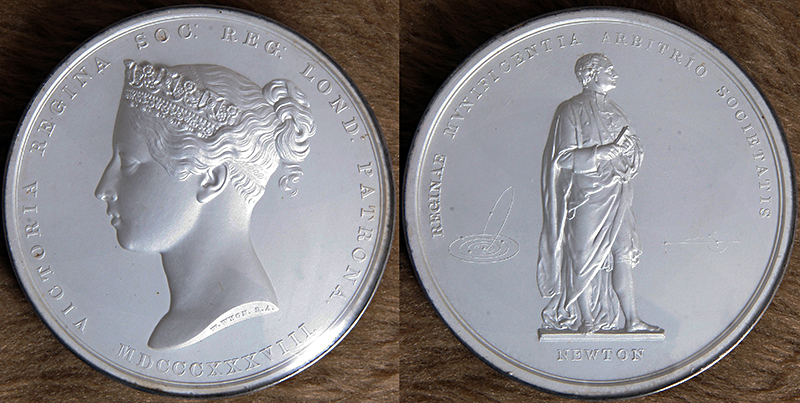By Dr George Beccaloni, February 2022.
It is a seemingly extraordinary fact that Charles Darwin was not awarded any medals for his discovery of, or work on, evolution by natural selection, because of disagreement among his colleagues about the validity of the theory. The medals he received were as follows:
1853: Royal Medal of the Royal Society, for his work on barnacles.
1859: Wollaston Medal of the Geological Society of London, in recognition of his scientific contributions to Geology.
1864 Copley Medal of the Royal Society, for his achievements in Geology, Zoology and Physiological Botany.
1879: Baly Medal of the Royal College of Physicians, for his distinguished work in Physiology.
The most prestigious of these awards was the Copley Medal - the Royal Society's highest honour, but Darwin's work on evolutionary biology was deliberately "not included" in the award (see https://royalsocietypublishing.org/doi/pdf/10.1098/rsnr.1976.0014). When awarding the medal, the President of the Society said:
"In his most recent work 'On the Origin of Species,' although opinions may be divided or undecided with respect to its merits in some respects, all will allow that it contains a mass of observation bearing upon the habits, structure, affinities, and distribution of animals, perhaps unrivalled for interest, minuteness, and patience of observation. Some amongst us may perhaps incline to accept the theory indicated by the title of this work, while others may perhaps incline to refuse, or at least to remit it to a future time, when increased knowledge shall afford stronger grounds for its ultimate acceptance or rejection. Speaking generally and collectively, we have not included it in our award." (See https://www.biodiversitylibrary.org/item/137990#page/581/mode/1up).
By 1868, Darwin and Wallace's theory had gained enough converts for the Royal Society to award a medal to Wallace partly in recognition of his independent discovery of natural selection. This was the Society's Royal Medal and it was the first of seven medals Wallace would receive. He had been put forward for the award by his friend Thomas Henry Huxley and the medal was presented to him at a ceremony on the 30th November 1868. Here is an account of what the President of the Society said:
"A Royal Medal has been awarded to Mr. Alfred Russell [sic] Wallace, in recognition of the value of his many contributions to theoretical and practical zoology, among which his discussion of the conditions which have determined the distribution of animals in the Malay archipelago (in a paper on the zoological geography of that region, published in the Proceedings of the Linnean Society for 1859) occupies a prominent place.
The case may be briefly stated thus :—The strait separating the islands of Baly and Lembok [Lombok] is only fifteen miles wide ; nevertheless the animal inhabitants of the islands are widely different, the fauna of the western island being substantially Indian, that of the eastern as distinctly Australian.
Mr. Wallace has described, in a far more definite and complete manner than any previous observer, the physical and biological characters of the two regions which come into contact in the Malay archipelago ; he has given an exceedingly ingenious and probable solution of the difficulties of the problem, while his method of discussing it may serve as a model to future workers in the same field.
Another remarkable essay, "On the tendency of Varieties to depart indefinitely from the Original Types," published in the Proceedings of the Linnean Society for 1858, contains an excellent statement of the doctrine of Natural Selection, which the author, then travelling in the Malay archipelago, had developed independently of Mr. Darwin ; and, apart from its intrinsic merits, this paper will always possess an especial interest in the history of science, as having been the immediate cause of the publication of the ' Origin of Species.'
Mr. Wallace's ability as an observer and describer of animal forms is shown in his numerous and valuable contributions to our knowledge of the animals, and especially the Pigeons, Parrots, and Butterflies, of the Malayan region.
It must not be forgotten that a knowledge of the circumstances under which the majority of these contributions to the higher branches of zoological science were made must greatly enhance our respect for the author. Mr. Wallace has spent the greater part of his life amidst the exhausting and often dangerous fatigues of a traveller in tropical countries rarely explored by Europeans ; and some of his most valuable papers are dated from places which some might consider so little favourable to study as Ternate and Sarawak.
Mr. Wallace,
I have the pleasure of presenting to you this Medal in recognition of the great merit of your researches both in practical and theoretical Zoology, carried out in countries where such pursuits are necessarily attended with more than usual difficulties and dangers." (See https://www.biodiversitylibrary.org/item/138506#page/174/mode/1up).
Darwin's reaction to this is unknown, but he would probably have been delighted for Wallace. It seems odd that although he lived until 1882 that no other society in the UK or abroad, awarded him a medal for his work on evolution.

Wallace's Royal Medal. Copyright Wallace Memorial Fund.
